Jonathan Schell - The Military Half
Here you can read online Jonathan Schell - The Military Half full text of the book (entire story) in english for free. Download pdf and epub, get meaning, cover and reviews about this ebook. year: 2013, publisher: Knopf Doubleday Publishing Group, genre: Detective and thriller. Description of the work, (preface) as well as reviews are available. Best literature library LitArk.com created for fans of good reading and offers a wide selection of genres:
Romance novel
Science fiction
Adventure
Detective
Science
History
Home and family
Prose
Art
Politics
Computer
Non-fiction
Religion
Business
Children
Humor
Choose a favorite category and find really read worthwhile books. Enjoy immersion in the world of imagination, feel the emotions of the characters or learn something new for yourself, make an fascinating discovery.

- Book:The Military Half
- Author:
- Publisher:Knopf Doubleday Publishing Group
- Genre:
- Year:2013
- Rating:5 / 5
- Favourites:Add to favourites
- Your mark:
- 100
- 1
- 2
- 3
- 4
- 5
The Military Half: summary, description and annotation
We offer to read an annotation, description, summary or preface (depends on what the author of the book "The Military Half" wrote himself). If you haven't found the necessary information about the book — write in the comments, we will try to find it.
The Military Half — read online for free the complete book (whole text) full work
Below is the text of the book, divided by pages. System saving the place of the last page read, allows you to conveniently read the book "The Military Half" online for free, without having to search again every time where you left off. Put a bookmark, and you can go to the page where you finished reading at any time.
Font size:
Interval:
Bookmark:
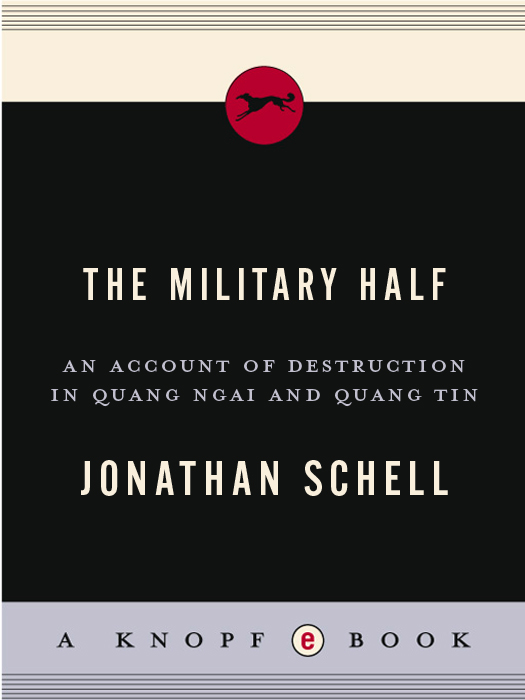
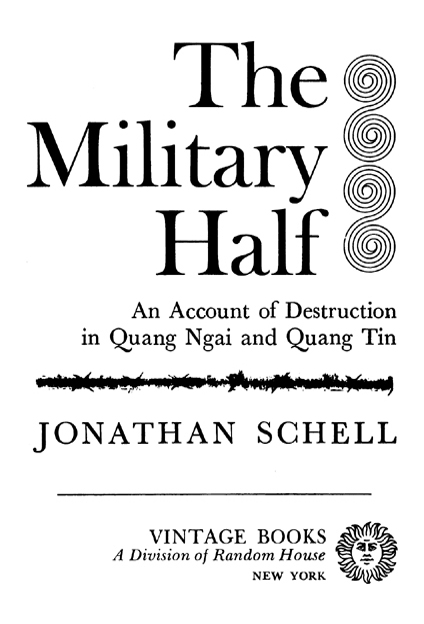
First Vintage Books Edition, June, 1968
Copyright 1968 by Jonathan Schell
All rights reserved under International and Pan-American Copyright Conventions. Published in the United States by Alfred A. Knopf, Inc., New York, and Random House, Inc., New York, and distributed in Canada by Random House of Canada Limited, Toronto.
By arrangement with Alfred A. Knopf, Inc.
The contents of this book appeared originally in The New Yorker, in slightly different form, under the title Quang Ngai and Quang Tin.
Illustrations by Tom Funk on
1968 The New Yorker Magazine, Inc.
eISBN: 978-0-307-80728-1
v3.1
I OFFER THIS BOOK with love to my brother
Orville, who, against everyones better judgment,
suddenly dropped out of his junior year in college
to set out for the Far East as third cook
or vegetable peeleron a Norwegian
dynamite freighter,
and thus set the basic style for the
many impulsive, unlikely trips East
we have both made since.
I WOULD LIKE TO EXPRESS my gratitude
to Ngo Long, who gave me great help
in preparing some
sections of this book, and shared
with me his
amazingly thorough and deep
knowledge of his country
and its people.
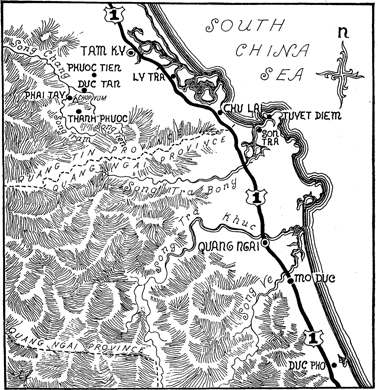

The Military Half
T his book is about what is happening to South Vietnamto the people and the landas a result of the American military presence. I shall not discuss the moral ramifications of that presence. I shall simply try to set down what I saw and heard first-hand during several weeks I spent with our armed forces in South Vietnam last summer. What I saw and heard had to do mostly with the destruction that was going on in South Vietnam, but at the same time I found that the peculiar character of this war tended to be defined for me by how the men in our armed forces reacted to the various special conditions of the war: the immense disparity in size and power between the two adversaries, the fact that Americans are fighting ten thousand miles from home, the fact that the Vietnamese are an Asian and non-industrialized people, the fact that we are bombing North Vietnam but the North Vietnamese are incapable of bombing the United States, the fact that our bombing in South Vietnam can be met only by small-arms fire, the fact that it is often impossible for our men to distinguish between the enemy and friendly or neutral civilians, the anomalousness and the corruption of the Saigon government, the secondary role played by the South Vietnamese Army we are supposedly assisting, the fact that the enemy is fighting a guerrilla war while we are fighting a mechanized war, and, finally, the overriding, fantastic fact that we are destroying, seemingly by inadvertence, the very country we are supposedly protecting. Like many Americans, I am opposed to the American policy in Vietnam. As I came to know the American men who were fighting there, I could feel only sorrow at what they were asked to do and what they did. On the other hand, I could not forget that these men, for the most part, thought they were doing their duty and thought they had no choice, and I could not forget, either, that they were living under terrible stress and, like fighting men in any war, were trying to stay alive and hold on to their sanity. If our country stumbled into this war by mistake, the mistake was not theirs. If our continuing escalation of the war is wrong, the guilt is surely not theirs alone. If one disaster after another is visited upon the Vietnamese people, these disasters are the inevitable consequence of our intervention in the war, rather than of any extraordinary misconduct on the part of our troops. Thousands of Americans, of course, have lost their lives or been wounded in Vietnam, many of them in the belief that they were fighting for a just cause, and some of the men I came to know in Vietnam will lose their lives or be wounded in that same belief. Some of our men have been brutalized by the war, just as I might have been brutalized if I had been fighting beside them, and just as men on both sides of all wars have been brutalized. Yet some of them have done the job assigned to them without losing their compassion for the noncombatant Vietnamese, or even for the enemy in combat. In this article, however, I am not writing, essentially, about the men in our armed forces. I am writing about a certain, limited segment of the warabout the destruction by the American forces, as I observed it (mostly from the air), of a particular rural area of South Vietnam. All of us must share the responsibility for this war, and not only the men who bear arms. I have no wish to pass judgment on the individual Americans fighting in Vietnam. I wish merely to record what I witnessed, in the hope that it will help us all to understand better what we are doing.
I n the spring of 1967, the United States Military Assistance Command in South Vietnam formed a new force, called Task Force Oregon, by assembling the 196th Light Infantry Brigade, the 3rd Brigade of the 4th Infantry Division, and the 1st Brigade of the 101st Airborne Division in Quang Ngai Province, which is the fifth province south of the Demilitarized Zone along the coast of the South China Sea. The creation of Task Force Oregon, which was to operate under the command of the 3rd Marine Amphibious Force, freed elements of the 3rd Marine Amphibious Force, which had been conducting operations in Quang Ngai since May of 1965, to move north to help combat increased activity along the Demilitarized Zone. The Annamese mountain range swings close to the sea in Quang Ngai Province, and between the mountains and the sea is a strip of arable flatland eighty kilometres long, twenty-five kilometres across at its widest point, and ten kilometres across at its narrowest point. The Allied Forces divided this strip, which supports more than eighty per cent of the provinces population, of approximately six hundred and fifty thousand, into four Tactical Areas of Responsibility, of roughly equal size, and assigned one each, from north to south, to the 196th Light Brigade, to a brigade of Korean Marines that had landed in Quang Ngai in the summer of 1966, to a brigade of the Army of the Republic of Vietnam (abbreviated as ARVN and pronounced Arvin by the Americans), and to the 3rd Brigade of the 4th Division. The 1st Brigade of the 101st Airborne Division was reserved as a roving force that could be flown anywhere in the province by helicopter to launch surprise attacks on enemy units. The principal mission of the troops that formed Task Force Oregon was to find and kill soldiers belonging to what are called main-force units of the Vietcong (or V.C., or National Liberation Front) and to the Army of North Vietnam who were operating in Quang Ngai Province. In order to break up any fixed patterns of operation that might help the enemy to predict their movements, elements of Task Force Oregon sometimes went outside Quang Ngai, carrying their operations into Quang Tin Province and Binh Dinh Province, which are adjacent to Quang Ngai on the north and on the south.
Task Force Oregons area of operation was part of a mountainous coastal region of South Vietnam that stretches south from the city of Hu to Binh Dinh Province, and had traditionally been known for its natural beauty and its poor, proud, and hospitable people. Because even the narrow strip of flatland that lay between the mountains and the coast in this region was too sandy for good crops, a large proportion of the villagers long ago took up other occupations, such as fishing in the South China Sea and lumbering in the mountains. Many took up home crafts, and the area became famous for silk and for mats woven of reeds that grew on the banks of the local rivers. Predominantly a rural people, the natives of these mountainous provinces spoke with a broad, flat accent that had a simple, country ring to the ears of a Vietnamese from Saigon. They were also reputed to be shorter than most other Vietnamese, and to have plain, clear features, square jaws, and bold, frank natures. As late as 1964, most of the primary schools in the area adorned their walls with the traditional Vietnamese motto Though your clothes may be soiled, keep your honor unspotted. Perhaps because the land was too poor to provide an adequate base for large fortunes, wealthy people in these provinces were particularly conscientious about giving their children the best education possible. Before the country was partitioned in 1954, the academic standards in most parts of what is now South Vietnam were far below the standards in the North, but students from the mountainous coastal provinces were noted for giving an excellent account of themselves at Hanoi University, which was regarded as the best in the country at that time. A large number of Vietnams most popular writers were born in the region, including the late novelist Nhat Linh, who attacked the colonial French and corrupt Vietnamese officials in novels of social protest, and later became a hero to young people in Saigon when he led a movement of scholars and students against the regime of President Diem. The mountainous inland regions of the northern provinces were populated by primitive tribes known to the French as Montagnards, who lived by burning away patches of the forest, cultivating the cleared land until the soil was exhausted, and then moving on to another site.
Font size:
Interval:
Bookmark:
Similar books «The Military Half»
Look at similar books to The Military Half. We have selected literature similar in name and meaning in the hope of providing readers with more options to find new, interesting, not yet read works.
Discussion, reviews of the book The Military Half and just readers' own opinions. Leave your comments, write what you think about the work, its meaning or the main characters. Specify what exactly you liked and what you didn't like, and why you think so.

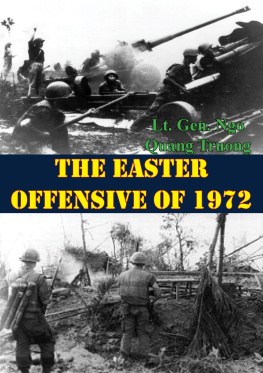
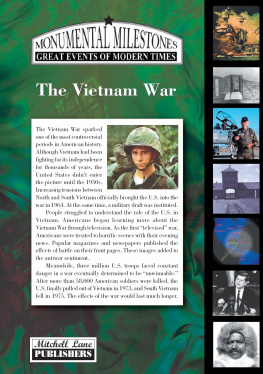


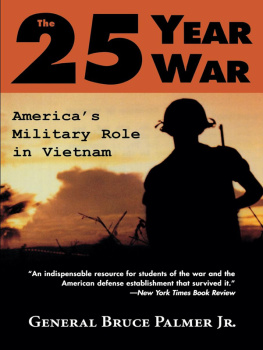
![Jesse Schell [Jesse Schell] - The Art of Game Design, 2nd Edition](/uploads/posts/book/119435/thumbs/jesse-schell-jesse-schell-the-art-of-game.jpg)